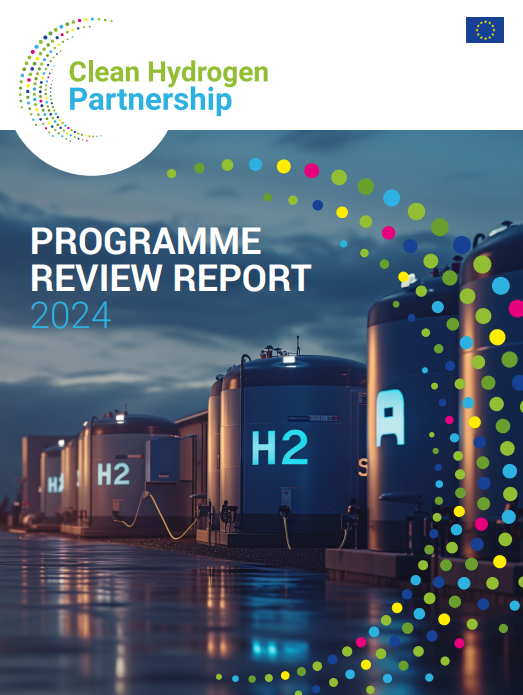
This Programme Review covers 81 projects active between January 2022 - March 2023, assigned to seven thematic pillars: Hydrogen Production, Hydrogen Storage and Distribution, Hydrogen End Uses – Transport, Hydrogen End Uses – Clean Heat & Power, Cross-Cutting Issues, Hydrogen Valleys and Hydrogen Supply Chains.
The report highlights numerous achievements of these projects in all areas of the hydrogen value chain, addressing the importance to efficiently combine the output coming from intermittent renewable energy sources with the fluctuating demand.
- Low-temperature and high-temperature electrolysis projects are showing progress against most of the technical KPIs, paving the way towards achieving cost-competitive, large-scale clean hydrogen production while pushing other low TRL technologies higher.
- Funding on hydrogen storage and distribution is gradually increasing, showing the vital role it plays in the hydrogen value chain. Hydrogen end-uses projects in both transport and clean heat & power are another cornerstone of the programme, presenting applications that can be considered ready for market deployment, while continuing efforts in fields like maritime and aviation with promising results.
- Cross-Cutting activities play an enabler role to reinforce Europe’s leadership position, accelerate mass-market adoption and maximise contribution to decarbonisation targets, while supply chain ones aim to define and support the activities needed to strength the overall supply chain related to hydrogen technologies, recently identified by the European Commission as a strategic value chain for Europe.
- Finally, the hydrogen valleys concept promoted by the JU has gained momentum and is now one of the main priorities of the European Commission for scaling-up hydrogen deployments and creating interconnected hydrogen ecosystems across Europe.
The scope of the Programme Review has further broadened compared to previous years. In addition to the Annual Programme Technical Assessment performed by the JRC which remains at the core of the Programme Review, the PRR now includes recommendations from the wider scientific community, gathered through a survey conducted in 2023.
A recurring observation of stakeholders, expressed also by the wider scientific community, is the need to increase funding on R&I in hydrogen technologies, while continue to strongly support deployment of hydrogen valleys across Europe and enable further collaboration between different sectors.
Additionally, the Programme Review reports on relevant studies commissioned by the JU, reports published by international bodies and selected international developments, providing a more holistic picture on the wider developments in the hydrogen sector and how the Clean Hydrogen JU activities fit in this wider context.
The Clean Hydrogen JU needs to build on these results in the coming years, while on the same time identify areas that haven’t been explored sufficiently to support.
Overall, the observations and recommendations discussed in this report will provide important feedback to the Clean Hydrogen JU, to analyse its progress towards achieving its objectives and make the necessary adjustments towards the second part of the programme implementation.
The purpose of the periodic Programme Review is to ensure that the Clean Hydrogen JU Programme is aligned with the strategy and objectives set out in its founding Regulation, as further elaborated in its Strategic Research and Innovation Agenda (SRIA) for 2021-2027.
The programme review report formed the basis for the discussions during the EU Research Days, which took place on 15-16 November 2023.
Details
- Publication date
- 20 November 2023
- Author
- Clean Hydrogen Joint Undertaking
